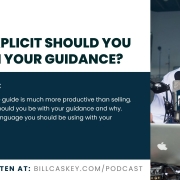Sales Methodology? Sales Process? Sales Philosophy!
Lots have been written, some tediously so, about Sales Process and Sales Methodology. It will make your eyes glaze over. So in this article, I want to clarify what each of these is (in my opinion) and also share a third, more important area of growth for sales driven companies: Sales Philosophy.
Just for clarity, here are my definitions:
Sales Process
It’s the sequence of events that characterize how a customer makes his/her way through from Awareness to Comprehension to Conviction to Action. It is usually discussed in a step-by-step way.
An example: 1) Entry Point, which is how a sales person begins the discussion with a prospect. 2) Needs Assessment, where the sales person asks a series of questions about the customer’s state or circumstance. 3) Education, where the sales person educates the customer as to how similar companies are solving their problem. 4) Alternatives, where the sales person brings a set of alternatives on how he/she might solve the presenting problem. 5) The decision, where the customer makes a decision on moving forward.
Obviously, these will vary a lot depending on your structure, culture, and goals.
Sales Methodology
This is more of an over-arching template, usually branded like Rackham’s SpinSelling, Konrath’s SNAP Selling or Miller-Heiman’s Conceptual Selling. It’s typically the “skill set” portion of selling. How to ask questions, how to position your product in the eyes of the customer, how to frame the value. “How To” is the meme of methodology.
Sales Philosophy
A totally missed and misunderstood element. This deals with the mentality of the seller. How one thinks about one’s self, one’s value, one’s expertise, one’s process, one’s customers, one’s follow up, one’s role in the sales process…etc,
My belief, after 26 years of training teams and coaching people is that a sound philosophy trumps process and methodology every time.
Why?
Because philosophy deals with everything that happens in the mind of the seller. It has to do with the seller’s belief about himself, his role and his human potential. We have called it the “inner game” or the “sales mindset” that is required to excel in this profession. Get your mind right, and right actions follow. When actions are right, results are right, too.
An Example.
John is a sales leader of a $35M company. He came to us to help him train his team. He wanted a “Sales Process” because non existed. Fair enough.
But, upon further examination, he not only needed a sales process, but we discovered that his people were selling from a position of weakness. They “needed” each piece of business they went after. We might say they were suffering an acute case of “attachment.”
Some of that was corporate culture, some were John (he denied it, of course), and some was just how selling has always been done. We might call it the “Dismal Paradigm.” It’s that notion that the seller is there to close the deal and all the burden shifts to the sales person to get it done.
Consequently, in our work with his team, we implemented a Sales Philosophy built on three premises.
- High Intent. This means that every sales person, every day, goes into the market with the INTENT of helping customers recognize and solve their problems. Once their intent slips to being “all about me” the power is gone and, likely, the sale is over. When you hear your team talking about “closing the sale,” or, “what do we need to do to get this off the street” you are out of control.
- Mindset of Abundance. This is a paradox that every sales person struggles with until they understand it. The world is full of abundance. There is a never-ending parade of opportunities that come your way. Once you see the world as a place of “Scarcity” (opposite of Abundance), your power, once again, slips away. You start to act needy and desperate. You give off the vibe of ‘attachment’ and no one wants to do business with that character.
- Your Process is Of Value. Yes, I know the sales process should be valuable to you. But that’s not where it begins. It must be valuable to your prospect, too. If it is just a pipe that you suck your prospect through, it is of no value to them. Your process must be sound and your people must be strong enough to be able to reveal it to your customer upfront. And help them see that following it is in their best interest. Your sales process should be a competitive strategy.
As you can see, these elements have nothing to do with Sales Methodology or Sales Process…but emphasizes the thinking behind it all.
NOTE: You might think that #3 is all about sales process but it isn’t It is about the “positioning of the process” rather than the process itself.
At your next sales meeting, spend an hour talking about your company’s sales philosophy. Send this link to them so they can begin to understand the power of a sound philosophy.








Good ideas